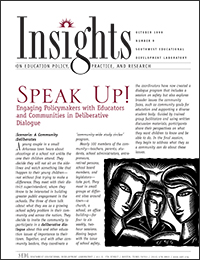What Might Deliberative Dialogue Offer to Policymakers, Educators, and the Public?

Scenario Continued: A Community Acts
After the study circles end, participants in the small Arkansas town decide to call on their fellow community members to work with them in bringing to life some of the ideas conceived in the study circles. They convene an “action forum” where they share and discuss the study circle results with their neighbors, and everyone has a chance to sign up for committees to address specific school issues. Among other things, one group commits to work with the school district to find the resources and time to build a fence around the school playground. Some of the parents in the study circles feel strongly that keeping children in and strangers out of playgrounds plays an important part in their children’s safety. They have learned that resources for such a venture are not available, and so they are willing to find funds and help build the fence themselves.
"To be effective, we need to listen to the patrons of the school district . . . . We are all in this together. I need to know if [the parents and community members] have concerns . . . [we] administrators are not addressing."
During the action forum, study circle participants also discuss with attendees some ideas they intend to present formally to the local school board and superintendent, as well as other ideas and special school programs under development by the district. One of these proposals, which had been discussed first by school administrators and then expanded on in the study circles, introduces conflict resolution training in the K-12 schools. Some study circle groups have researched how to approach the school safety issues the town has and have concluded that helping students and adults learn how to stop violence before it starts is the first step.
Policymakers are frequently surprised to see that issues raised by some community members in dialogues differ from those the policymakers anticipated.
Education policymakers—administrators, school superintendents, school board members, legislators, and other government officials—must weigh many factors when creating and implementing education policies. Educators face a changing context (e.g., shifting demographics) for tending to their students’ everyday needs. Other community members have their own unique investments in the education of their youth. Deliberative dialogue can allow local community members to express their concerns to policymakers, and in turn help policymakers to better know the communities they serve. It can begin a process of building support for and community involvement in education. And it can help ensure that educators are not alone in the work of educating children. Like the community in the scenario, policymakers, educators, and community members all benefit when they understand each other and share a common vision for what their children need in order to learn well.
Next Page: Understanding Community Concerns and Needs

